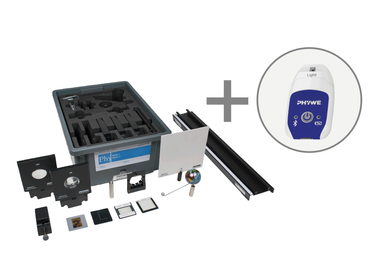Principle
The law of imagery is generally first theoretically derived or - depending on the class's proficiency - simply stated and then experimentally confirmed or tested. The experimental test can be performed as suggested.
It is also possible to conduct the experiment in this way without previous knowledge; however, in this case the student will not understand why the reciprocals of f, g and b should be taken. This is also the case when the law of imagery is only stated.
Benefits
- Multifunctional light box - All-in-one: Can be used for geometric optics on the table, colour mixing and on an optical bench
- Extension with others sets at anytime, no additional light sources needed, recognition value for students
Tasks
Which law holds true for images with a convex lens? Determine which correlations exist between the focal length f, the object distance g and the image distance b when real images are formed with a convex lens.



